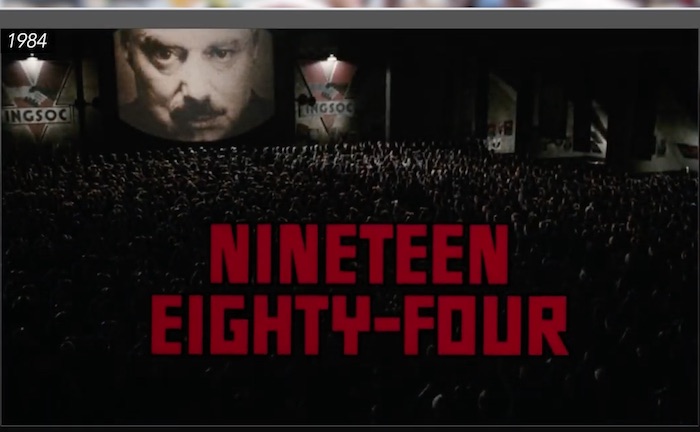Opinion
Politicized Language: A harmless evolution of language or a step towards “1984″?

Good chance you’ve noticed some new words lately, or new meanings for words that used to mean something else. Terms like “birthing person” are new, and words like “racism” seem to be taking on a new meaning. 19 time Emmy Award Winning Journalist John Stossel is back with his take on “Politicized Language”
From StosselTV
“Social justice” activists are changing and redefining many words, from “birthing people”, “equity”, “mistress”, “violence”, to “racism”.
Is that a harmless evolution of language? Or a step towards “1984?”
Tim Sandefur of the Goldwater Institute argues that today’s language changes are dangerous. For example, one activist declared that “a transgender woman of color walking down the street and being called a man — [that] is an act of violence.” “It is quite chilling,” says Sandefur, the degree to which the social justice movement… is willing to control our language.”
“The only way that we have as human beings to deal with one another is through language, discussion, debate, deliberation. If we say that that’s a form of violence … then the only way left for us to relate to one another is through power,” he adds. I push back , saying that the social justice movement has good intentions.
—- So you don’t miss the weekly video from Stossel TV, sign up here: https://johnstossel.activehosted.com/f/1 —-
2025 Federal Election
What Trump Says About Modern U.S. And What Carney Is Hiding About Canada

“Reporters once asked legendary boxer Rocky Graziano why he hugged his opponent after the guy had pounded him senseless for 15 rounds. “He stopped punching me, didn’t he?” That sums up the reaction of Boomer voters hugging Mark Carney after ten years of having Liberals pound them. They can rationalize any amount of suffering.”
The two looming figures in the current “hurry up before they find out who Mark Carney is” election are Carney, the transnational banker/ climate zealot/ not-Trudeau Liberal, and Donald Trump. Yes, Pierre Poilievre is running against Carney, but Carney and the Gerry Butts braintrust are running against the U.S. president.
And not just POTUS 45/47. They’re running against the SNL cartoon figure embraced by Canada’s mainstream media outlets. Depending on the day the Toronto Star/ CBC/ Ottawa Citizen iteration of Trump is “stupid”, “racist”, “sex fiend” and, for this campaign, the boogeyman who will swallow Canada whole. While these scribblers and talking heads themselves are going broke, they imagine Trump as an economic moron collapsing the western economy.
All the clever Conservative ads, all the Carney flubs, all the revelations of election rigging by Chinese operatives— none of it matters to Canada’s Boomers huddled against the blustering winds of Trump. They call it Team Canada but it might just as well be Team Surrender to people who are willing to keep the Liberals’ Gong Show going for another four years.
As they say, you’re welcome to your own opinion, you’re just not welcome to your own facts. And the facts are that Trump and Carney are representative of their separate nations in 2025. Before we address the parachute PM Carney let us suggest that CDNs weaned on Stephen Colbert and John Oliver have little idea why Trump is the most impactful American politician of the century so far.
But don’t take our word for it. Here’s Democratic comedian Dave Chappelle explaining why so many remain loyal to the former Democrat and reality TV star in the face of impeachments, criminal charges and yes, bullets. Chappelle, who lives outside the Hollywood bubble in Ohio, said, “I’m not joking right now, he’s an honest liar. That first (2016) debate, I’ve never seen anything like it. I’ve never seen a white male billionaire screaming at the top of his lungs, ‘This whole system is rigged.’

“And the moderator said, ‘Well Mr. Trump if, in fact, the system is rigged as you suggest, what would be your evidence?’ He said, ‘I know the system is rigged because I use it.’ I said ‘Goddamn’.
“No one ever heard someone say something so true. And then Hillary Clinton tried to punch him on the taxes. She said, ‘This man doesn’t pay his taxes,’ he said, ‘That makes me smart.’ And then he said, ‘If you want me to pay my taxes, then change the tax code. But I know you won’t, because your friends and your donors enjoy the same tax breaks that I do.’…
“No one had ever seen anything like that. No one had ever seen somebody come from inside of that house outside and tell all the commoners we are doing everything that you think we are doing inside of that house. And a legend was born.”
In short, Trump is what we want politicians to be. Aspirational, yes. But willing to act. We can take it. Yes, his truth is wrapped in multiple layers of balderdash and folderol. There is a preening ego. Self serving. Vainglorious. Opportunistic. Bombastic.
But he recognized that no one— GOP included— wanted anything to do with closing borders, ending foreign wars, levelling the trade barriers. So while Canadians whined, he took them on, and for that he’s been given two terms in the White House. You can understand why people wanted him dead last summer. He’s bad for the business he exposed in that debate with Hillary.
So Canadian liberals might sneer and condescend, but Trump’s answering to a legitimate voice in an America that was deceived and abused during Covid. And had a senile man as POTUS being manipulated by unseen characters behind the scenes.
Which begs the question: What in the Canadian character is Mark Carney answering to as he is dropped into the seat formally occupied by Justin Trudeau? The most obvious answer is Trump’s 51st state musings as he seeks to re-order the world’s tariff system. But what about repudiating everything he and his party stood for the past decade? How does that fit into the Carney identity?
While Trump has a resounding mandate to pursue the issues he campaigned on, Carney has a manipulated Liberal leadership contest, no seat and Mike Myers. Plus a media that owes its living to his party’s bribing them.

It would be hard to imagine more own goals than Carney’s record since the Liberals rigged his nomination. The China denials, the offshore tax evasions, the three passports, the renunciation of his entire work history, the re-hiring the worst of Trudeau’s cabinet, the bad body language… yet every gaffe increases his numbers in the purchased polls and the bought media. It will be an amazing story when it’s written.
But it’s not being written that way now. Because Donald Trump has activated Canada’s passion for authority and the expert class. While the rest of the world has awakened to the government’s deliberate manipulation of fear and white-coat reverence during Covid, Canada’s Boomers are still in awe of people like Carney. They still think the vaccines work. That The Science was behind it all.
So prepare for another 15 rounds of being slugged in the head by people who don’t have your goals in mind. Don’t say you we weren’t warned.
Bruce Dowbiggin @dowbboy is the editor of Not The Public Broadcaster A two-time winner of the Gemini Award as Canada’s top television sports broadcaster. His new book Deal With It: The Trades That Stunned The NHL And Changed Hockey is now available on Amazon. Inexact Science: The Six Most Compelling Draft Years In NHL History, his previous book with his son Evan, was voted the seventh-best professional hockey book of all time by bookauthority.org. You can see all his books at brucedowbigginbooks.ca.
Internet
US government gave $22 million to nonprofit teaching teens about sex toys: report

From LifeSiteNews
The Center for Innovative Public Health Research’s website suggests teenage girls make their ‘own decisions’ about sex and not let their parents know if they don’t want to.
For almost a decade, the U.S. government funded a group that actively works to teach kids how to use sex toys and then keep them hidden from their parents to the tune of $22 million.
According to investigative reporter Hannah Grossman at the Manhattan Institute, The Center for Innovative Public Health Research (CIPHR) has been educating minors about sex toys with public funds.
Records show that the millions given to the group since 2016, according to its website, go toward “health education programs” that “promote positive human development.”
However, the actual contents of the programs, as can be seen from comments from CIPHR CEO Michele Ybarra, seem to suggest that its idea of “human” development is skewed toward radical sex education doctrine.
In 2017, CIPHR launched Girl2Girl, which is funded by federal money to promote “sex-ed program just for teen girls who are into girls.” Its website lets users, who are girls between ages 14 and 16, sign up for “daily text messages … about things like sex with girls and boys.”
The actual content of some of the messages is very concerning. Its website notes that some of the texts talk about “lube and sex toys” as well as “the different types of sex and ways to increase pleasure.”
The website actively calls upon teenage girls to make their “own decisions” and not let their parents know if they don’t want to.
Grossman shared a video clip on X of Ybarra explaining how they educate minors about the use of “sex toys” and dealing with their parents if they are found out.
The clip, from a 2022 Brown University webinar, shows Ybarra telling researchers how to prepare “young person(s)” for her research.
She said if they are doing “focus groups,” she will ask them, “Okay, so what happens if somebody comes into the room and sees words like penis and sex toys on your screen — on your computer screen or on your phone? What if it’s your mom?’”
In 2023, CIPHR launched Transcendent Health, which is a sex-education program for minors who are gender confused. This initiative received $1.3 million of federal grant money that expired last month.
Grossman observed that the federal government “should not fund programs that send sexually explicit messages to minors and encourage them to conceal these communications from parents.”
She noted that in order to protect children and “prevent further harm,” U.S. President Donald Trump’s Department of Health and Human Services “should immediately cancel CIPHR’s active contract and deny its future grant applications.”
“By doing so, the Trump administration can send a clear message: Taxpayers will no longer foot the bill for perverted ‘research’ projects,” she noted.
The Trump administration has thus far, through the Department of Government Efficiency (DOGE), exposed billions in government waste and fraud. Many such uses of taxpayer dollars are currently under review by the administration, including pro-abortion and pro-censorship activity through USAID, “Diversity, Equity, and Inclusion and neo-Marxist class warfare propaganda” through the National Science Foundation, and billions to left-wing “green energy” nonprofits through the Environmental Protection Agency.
-

 2025 Federal Election2 days ago
2025 Federal Election2 days agoCommunist China helped boost Mark Carney’s image on social media, election watchdog reports
-

 2025 Federal Election1 day ago
2025 Federal Election1 day agoRCMP memo warns of Chinese interference on Canadian university campuses to affect election
-

 2025 Federal Election2 days ago
2025 Federal Election2 days agoFifty Shades of Mark Carney
-

 2025 Federal Election22 hours ago
2025 Federal Election22 hours agoResearchers Link China’s Intelligence and Elite Influence Arms to B.C. Government, Liberal Party, and Trudeau-Appointed Senator
-

 Energy2 days ago
Energy2 days agoTrump signs four executive orders promoting coal industry
-

 COVID-1919 hours ago
COVID-1919 hours agoFauci, top COVID officials have criminal referral requests filed against them in 7 states
-

 2025 Federal Election2 days ago
2025 Federal Election2 days agoConservative Party urges investigation into Carney plan to spend $1 billion on heat pumps
-

 MAiD2 days ago
MAiD2 days agoDisability rights panel calls out Canada, US states pushing euthanasia on sick patients









